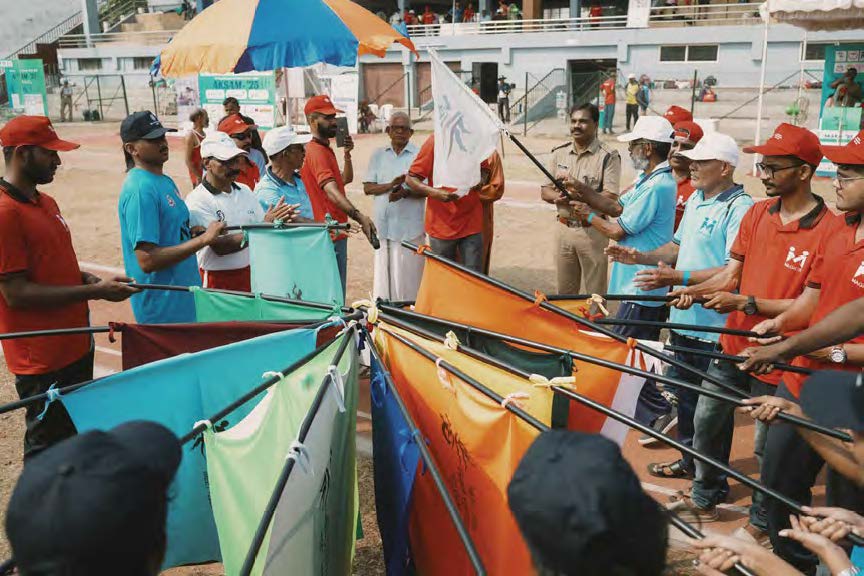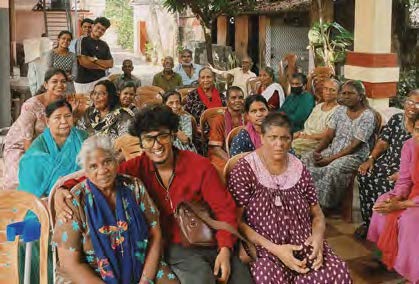Praveen Pai
Focal Point for WHO Global Network for Age-Friendly Cities and Communities (WHO-GNAFCC) in Kochi, Center of Excellence for Developing Age-Friendly Communities (CEDAC)
Download PDF
In the bustling coastal city of Kochi, nestled in the southern Indian state of Kerala, a quiet revolution is taking place. As the first city in Southeast Asia to join the World Health Organization’s Global Network for Age-Friendly Cities and Communities (WHO-GNAFCC), Kochi is pioneering a new approach to urban development that puts the needs of older individuals at the forefront.
“Our goal is to create a city where older adults can live with dignity, independence, and full participation in community life,” says Anil Kumar, Mayor of Kochi City and head of Kochi’s Age-Friendly City Initiative. “We’re not just building for today, but for the future we all hope to grow old in.”
The Challenges of an Aging Kerala
Kerala’s demographic landscape is changing rapidly. Known for its high literacy rates and progressive social policies, the state now faces the challenges of an aging population. Traditional family structures are evolving, with the joint family system giving way to nuclear families. This shift, coupled with migration and unemployment among both youth and the aging population, has created new vulnerabilities for older adults.
“We’re seeing a decline in healthy life expectancy,” notes Dr. Sajesh Ashokan, President of Kerala chapter of the Geriatric Society of India. “Our health care system is strained, and social isolation among the elderly is becoming a serious concern.”
Kochi’s Innovative Approach
 All Kerala Senior Athletics Meet-2025 Maharajas Ground, Kochi
All Kerala Senior Athletics Meet-2025 Maharajas Ground, Kochi
Recognizing these challenges, Kochi Municipal Corporation made a bold move in 2021 by adopting the WHO’s Age-Friendly Cities and Communities framework. This decision set in motion a series of initiatives that are transforming the city.
Understanding that several stakeholders must collaborate to advance an age-friendly city, Kochi Municipal Corporation authorized the Center of Excellence for Developing Age-Friendly Communities (CEDAC). The Center is run under the auspices of a grassroots NGO called Managing and Generating Income for Community Services (MAGICS), which works in the field of aging to design and develop strategies, programs, and actions. CEDAC developed the Kerala Community Care Network model, which brings together stakeholders in the aging sector to align efforts on a common platform. This model, currently applied in Kochi, is guided by state and national policy. The Center acts by creating a common ground with an agenda to make the city an age-friendly model for the rest of the state and country. This was a best practice that created a good space for collaboration in planning and implementation.
Numerous stakeholders bring assets to this effort. RespectAge is a resource center combatting elder abuse and ageism. “We’re not just providing support; we’re changing the narrative around aging,” explains Dr. Snovy Manjooran, the center’s director who is a psychologist and works closely with the judicial mechanism to address elder abuse in the state.
Vayo Vigyan is a digital literacy program bridging the technology gap for older adults. The program is hosted in a college and managed by a group of students who are committed to training the older persons who enroll in the project as “students of technology,” while the older participants act as mentors, in turn, for the college students. “I never thought I’d be able to video call my grandchildren in America,” beams 72-year-old participant Achuthan Nair. “Now, I feel connected to the world.” Every senior student is assigned a young tutor, and it ensures a lot of opportunity for intergenerational exchange. “I was able to openly discuss many of my personal problems with Mrs. Janaki during our interactions outside the classroom… She is such a good mentor with lot of life experiences,” says Ms. Janet, a tutor. The intergenerational exchanges through such programs are very influential not only for the participants but for the entire college and can be a model for similar programs at other institutions.
Another intergenerational connection program, Sallapam, promotes social inclusion. “It’s not just about combatting loneliness,” says Program Director Dr. Sharon Anna Thomas, who also leads the community health services for older persons. The program envisions generating wellbeing and happiness among older persons and helping them reframe aging. The program also incorporates yoga, nutrition, and mental health activities. “It’s about creating a society where every generation values and learns from each other.” The project also serves as a means for older people to become part of a social network so that they have a safety net should there be a need to shelter in place again — a lesson from the COVID-19 pandemic.
 St.Joseph Waifs Home, Fort Kochi, Kerala
St.Joseph Waifs Home, Fort Kochi, Kerala
Hand-in-hand with age-friendliness, Kochi developed a comprehensive program focusing on early detection and support for dementia. “We’re seeing a real difference in how our community understands and supports those living with dementia,” reports Alex, who is also a social worker and entrepreneur in the field. Kochi was declared the first dementia-friendly city in India with the support of a university project called “Udbodh,” which was designed by the Center for Neurosciences at Cochin University of Science and Technology. As part of the project, the Memory Café, organized with support of Kochi Municipal Corporation, is a venue where people with dementia and their caregivers can come together to share their experiences and discuss them with experts who are available in an informal café setting.
Finally, the municipality’s community health services and a division for happiness and wellbeing take actions to promote healthy lifestyles and opportunities for health promotion and maintenance of functional capabilities. Capacity building of the grassroots network in the areas of health and welfare for older adults is also a top priority for the city that is aligned to the WHO framework.
Political Will and Financial Commitment
What sets Kochi apart is the strong political consensus behind these initiatives. In a rare show of unity, council members across party lines supported the age-friendly city framework. This commitment was backed by a substantial budget allocation of 50 million Indian Rupees (approximately 600,000 USD) for age-friendly initiatives during the current financial year.
“It’s not just about the money,” explains Mayor Anil Kumar. “It’s about prioritizing the wellbeing of our older citizens in every decision we make.” Kumar added: “Kochi is not a planned city and has many areas that need to be re-worked, especially with regard to transport infrastructure and housing. We have a master plan for the city that considers all the eight domains of age-friendliness.”
Lessons for a Global Audience
Kochi’s experience offers valuable insights for cities worldwide grappling with aging populations:
- Holistic Approach:
Address multiple aspects of urban life simultaneously, recognizing the interconnected nature of challenges facing older adults.
- Community Engagement:
Foster a sense of shared responsibility for the wellbeing of older adults through programs that encourage active participation.
- Innovative Financing:
Allocate dedicated budgets for age-friendly initiatives in a few municipal departments to ensure sustained commitment.
- Continuous Evaluation:
Regularly assess and adapt programs to ensure their continued relevance and effectiveness.
Looking to the Future
As Kochi continues its journey towards becoming a truly age-friendly city, the impact of its initiatives is already being felt. “I feel seen and valued in a way I never did before,” says 78-year-old Lakshmi Menon, a regular at the RespectAge center. “Kochi is showing that getting older doesn’t mean becoming invisible.”
With the global population aging rapidly, cities around the world would do well to look to Kochi as a model of how to create inclusive, supportive environments for older adults. By investing in age-friendly initiatives today, we can build cities that not only support healthy aging but enrich the lives of residents of all ages.
“In Kochi, we’re not just preparing for an aging population,” concludes Mayor Anil Kumar. “We’re creating a city where longevity is celebrated, and every citizen can look forward to a fulfilling life at any age.”
Suggested Citation:
Pai, Praveen. 2025. “Kochi: A Model for Age-Friendly Urban Development in India.” AARP International: The Journal, vol. 16: 84-87. https://doi.org/10.26419/int.00368.019.